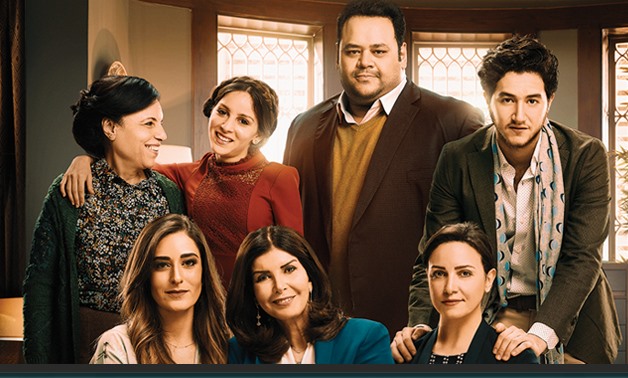
Source: Facebook page of CBC Drama
CAIRO - 19 June 2017: Adapting famous novels or black-and-white films into drama series has become something of a tradition; “Afrah al-Qouba” and “Zat” are but two examples from the past few Ramadans.
This year, Egyptian writer Tamir Habib took Ihsan Abdel Quddous widely-loved and popular novel “La Tutf'e al-Shams” and turned it into a drama series. More than 50 years ago renowned director Salah Abu Seif adapted the novel into a movie, but now Habib has added his own touch, which in some ways is very different from the novel or the original movie production.
After the huge success of 2016’s “Grand Hotel,” which was an adaptation of a Spanish soap opera, Habib returns this Ramadan with the adaptation of “La Tutf'e al-Shams,” which begs the question of why Habib insists on retelling the stories of others rather than write his own.
I read the novel when I was 11 years old and watched the movie at the same age and loved them both, so I had my reservations about the drama series before it was aired, as I have seen many classic films and novels ruined by TV adaptations.
For the first week or so I made the mistake of constantly comparing the series to both the film and novel and kept finding flaws and mistakes.
Finally, though, I stopped comparing the past and the new adaptation of “La Tutf'e al-Shams” so I could continue watching it, especially as I kept seeing everyone around me so besotted with the show. None of these people, however, had read the novel or seen the film; they saw it with a fresh point of view and had nothing to compare it to.
Habib tried to repeat the success of last Ramadan by including the same stars that made “Grand Hotel,” which won the most-watched drama series and proved to be very popular with viewers from across the Arab region. Amina Khalel, Muhammad Mamdouh and Mai Al-Gheti all lived up to the audience’s expectations after their exquisite performances last year, although Khalel was less impressive (partly due to the character rather than her acting).
The character of Engy, played by Khalel, is hugely different from the role played by Laila Taher in the 1960s film who awaits her beloved, who is from a lower social class, and eventually marries him. In the drama series, however, this is completely rewritten: Engy leaves her beloved and marries someone else, then cheats on her husband.
The biggest difference, however, is what befalls the youngest son, who in the novel and film is killed in a road accident. In the drama series he just disappears and marries a girl his family disapproves of.
Overall, the family in the serial is far from believable for the average viewer. Yes ,there is no perfect family, but also no family can be as dysfunctional as this one. It is understandable that every drama needs a bit of exaggeration, but if it exceeds a certain level then it just becomes a shallow piece of fiction.
Perhaps the best part of the new “La Tutf'e al-Shams” series is the acting of Muhammad Mamdouh and Ahmed Malik, who both regenerated their roles and made them their own; their acting made those of us who are familiar with the film and novel see a totally different and unique side to characters we had grown to love.
Mai Al-Gheti is another star who made her mark on the show as the funny Habiba, who falls in love with Adam, played by Ahmed Malik, and changes him for the better, in her view. Another actress who in my opinion presented one of her best roles is Sherin Reda, who portrays the free spirited Rasha who lives her life as she sees fit and is a close friend of Adam.
The biggest let down for me was the mother’s character, played by Mervat Amin. Given her long history in cinema and TV, Amin did not reflect this acting history in her performance, lacking that maternal emotion and loyalty to her husband. Yes, she married him without actually loving him as her heart was elsewhere. He has only been dead a year or so and she talks about him with unexplained contempt, even to his children, who also do not seem to be too bothered about him. The only exception is Aya, played by Gamela Awad, and only in one scene, where she protests against her mother’s husband coming to live in her father’s house.
The idea of the drama series is an interesting one but it might have been better if it was not linked to Quddous’s novel as the comparison is not in the series’ favour.

Comments
Leave a Comment